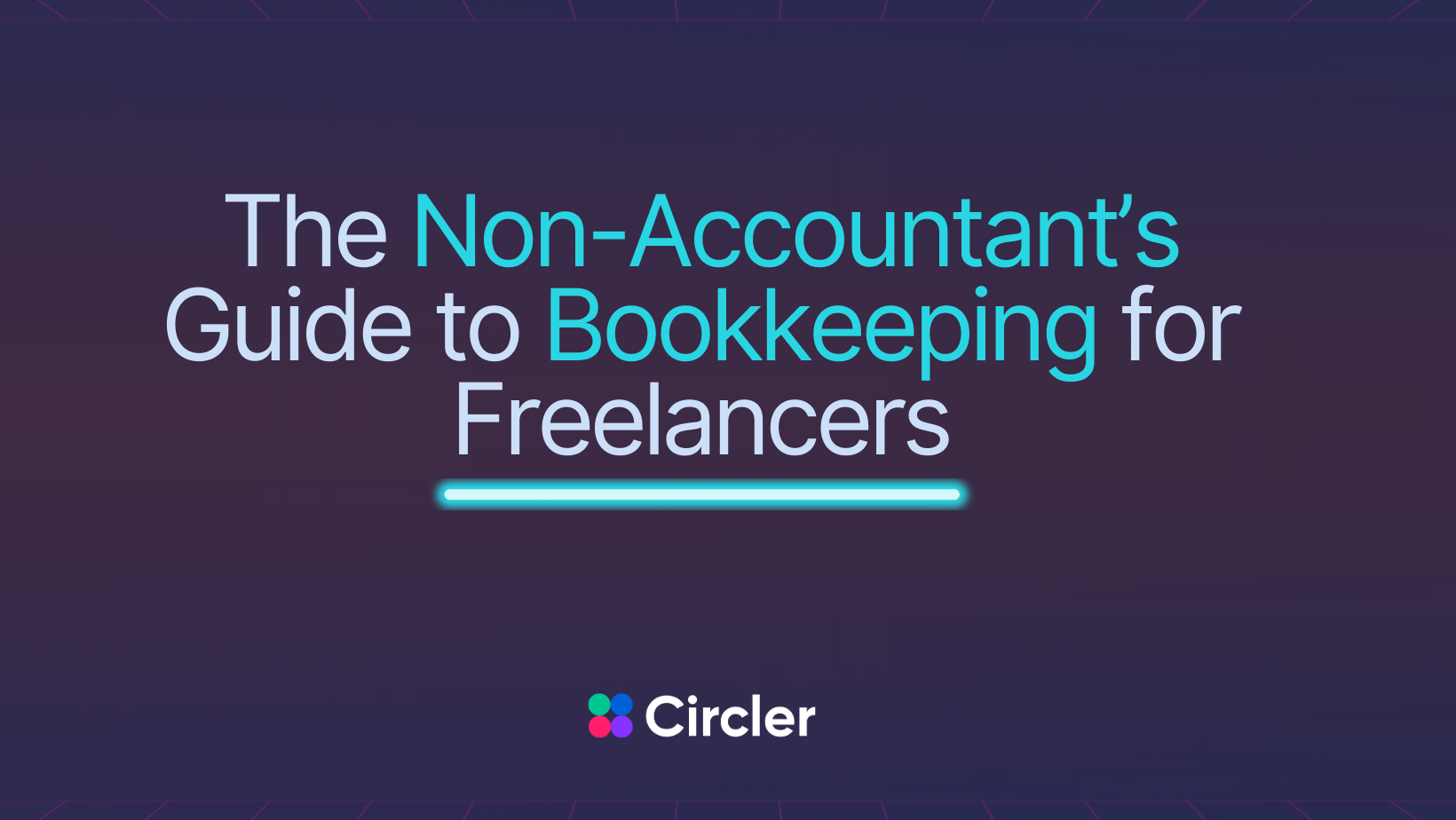The Non-Accountant’s Guide to Bookkeeping for Freelancers

Bookkeeping is essential for your business's financial health and growth. It involves everyday activities like entering data, sorting transactions, handling incoming payments, and managing payroll.
Navigating bookkeeping as a small business owner is essential, even if you use accounting software. Understanding the mechanics behind automated tasks like transaction categorization is key. It all begins with getting your accounting software set up correctly.
So here is Circler's Bookkeeping for Small Businesses: A Practical Approach on Bookkeeping for Small Business & Freelancers, Follow the Below Steps to effectively manage your bookkeeping.
#1. Set Up Your Accounting Software.
Popular options in the market include QuickBooks, Xero, FreshBooks, and Wave. These platforms offer a range of functionalities tailored to different business needs. Often, the setup process includes:
- Input Your Business Information: Start by entering all relevant details about your business.
- Link Business Bank Accounts: Connect your accounts to the software for real-time transaction tracking.
- Provide Accountant Access: Allow your accountant to access the software for making adjustments and spotting errors.
- Customize Your Chart of Accounts: Ensure it reflects your business operations and financial structure accurately.
#2. Choosing the Right Entry System.
It's crucial to decide which accounting system suits your business best:
single-entry or double-entry. This choice will significantly influence how you manage your finances and structure your bookkeeping processes.
- Single-Entry Accounting: This method records each of your transactions once, categorizing them as either an expense or income. It's straightforward and particularly suitable for smaller businesses with simple financial structures, typically without significant inventory or complex equipment expenses. Single-entry accounting is akin to maintaining a checkbook. However, it's important to note that this method doesn’t provide a detailed track of your business's assets and liabilities compared to double-entry accounting.
- Double-Entry Accounting: More comprehensive, each transaction is entered twice, as a debit in one account and a credit in another. This system is better suited for businesses with more complex transactions and offers a clearer picture of where your money is coming from and going.
The system you select will shape how you track and understand your business’s financial health, so choose one that aligns with your business's complexity and reporting needs. Using Circler, it automatically takes care of double-entry accounting without showing complexity on records.
#3. Choosing Your Accounting Method.
Another critical step in setting up your bookkeeping is deciding between cash-basis and accrual-basis accounting. The method you select will significantly influence how your financial reports look and how you interpret your business's financial health
- Cash Basis Accounting: It Records transactions only when cash is actually exchanged. Income is recognized when received, and expenses are recorded when paid. This method offers a clear view of current cash flow but doesn’t track unpaid invoices or bills until they're settled.
- Accrual Basis Accounting: Transactions are recorded when they occur, regardless of money exchange. Invoices and bills are logged when issued, not when paid. This method provides a comprehensive overview of financial activities over time and aligns with Generally Accepted Accounting Principles (GAAP), offering a more accurate reflection of a company’s financial health.
#4. Managing Daily Transactions.
Effective bookkeeping involves diligent management of your business transactions and staying on top of accounts receivable and payable.
Managing Transactions is crucial, and its daily routine includes:
- Importing and Categorizing Transactions: Ensure each transaction is properly recorded under the correct category.
- Reconciling Transactions: Regularly match transactions against bank statements to verify accuracy.
- Adherence to Your System and Method: Transactions should align with your chosen entry system and accounting method, whether it's single-entry or double-entry, and cash or accrual basis.
#5. Handling Accounts Receivable and Payable:
A. Accounts Receivable: As a small business, managing accounts receivable ensures you get timely payments for your services or products. This involves:
- Sending out accurate estimates and invoices.
- Tracking due dates and following up on payments.
- Using accounting software with features like automated payment reminders, or opting for separate invoicing software.
B. Accounts Payable: Equally important in making sure you pay your bills on time to avoid late fees and maintain a good business reputation. Unpaid expenses are recorded as accounts payable, and careful tracking is necessary to manage these obligations effectively.
Example to illustrate how unpaid expenses are recorded as accounts payable.
Suppose your business orders office supplies worth $500 from a vendor and receives an invoice with a 30-day payment term. Even though you haven't paid the invoice yet, this $500 is an expense that needs to be recorded immediately in your books. In your accounting system, you would record this $500 under 'Accounts Payable.'
This categorization acknowledges that while you have incurred the expense (receiving the supplies), the actual cash payment has yet to be made. By recording it as accounts payable, you're effectively tracking that your business owes $500 to the supplier, which is a liability that needs to be settled within the agreed payment term.
Careful tracking of such accounts payable ensures you're aware of upcoming payments, helping to manage cash flow and maintain good relationships with your suppliers by paying on time.
#6. Set up Your payroll
Some businesses process payroll within their accounting software; others subscribe to a separate payroll software product like "Rippling". How you set up and manage payroll will depend on which software you choose, how many employees you have, and whether you offer them additional benefits.
#7. Coordinate with a tax specialist
Small businesses often work with tax advisors to help prepare their tax returns, file them, and make sure they’re taking advantage of Small-Business Tax Deductions. Though you may not work regularly with a tax specialist year-round, you’ll want to connect with one sooner rather than later so you’re not rushed come tax time.
#8. Manage financial statements and documents with Circler Bookkeeping AI
Bookkeeping, in large part, has to do with accurate recordkeeping. This means recording transactions and saving bills, invoices, and receipts so you have all the data you need to run reports. Accounting software makes it easy to store these documents and reference them in case of an accounting error or audit.
How Circler Bookkeeping AI Empowers Businesses
Circler Bookkeeping AI is revolutionizing the way small businesses handle their finances. Here's how it brings efficiency, accuracy, and control to your bookkeeping process:
- Fast Transaction Entries: Circler.io ensures precision in recording all financial transactions. Circler's advanced algorithms minimize human errors, providing you with accurate and reliable financial data. Circler records the transaction and makes it easier for you to review the output.
- Intelligent Receipt Interpretation: The AI system effortlessly interprets and categorizes information from receipts. Just upload your receipts and Circler will sort and record the data, streamlining your expense tracking.
- Prompt-Based Journal Entry Creation: Circler.io responds to your specific prompts to create journal entries. This feature not only saves time but also allows for customization in how financial events are recorded, ensuring they align with your business’s accounting practices.
- Staying Updated with Tax Compliance: With ever-changing tax laws, Circler.io keeps your business compliant. It updates automatically to align with the latest tax regulations, reducing the risk of costly compliance issues.
- Cost Savings: By automating routine bookkeeping tasks, Circler.io reduces the need for extensive manual accounting work, saving money on bookkeeping services and freeing up resources for other business areas.
- Real-Time Reporting: Get instant access to your financial reports. Circler.io provides real-time insights into your business's financial performance, aiding in timely and informed decision-making.
- Enhanced Financial Management: The AI offers predictive analytics and budget forecasting, helping you to plan ahead and manage your finances proactively.
- User-Friendly Interface: Designed with ease of use in mind, Circler.io makes sophisticated bookkeeping accessible even to those with limited accounting experience.
- Scalability: As your business grows, Circler.io adapts, capable of handling increased transaction volumes and more complex financial scenarios.
Conclusion: The Important Role of Bookkeeping in Small Businesses
Bookkeeping is more than just a financial chore; it's a crucial element for the success and health of your small business. Here's why:
- Separation of Finances: By distinctly separating business and personal finances, bookkeeping safeguards you from personal liability associated with business debts or issues.
- Early Error Detection: Regular management of transactions and reconciliations through bookkeeping can spot mistakes early, preventing larger financial problems down the line.
- Tax Simplification: Streamlined bookkeeping makes tax processes more manageable. Working effectively with tax professionals can lead to significant cost savings.
- Financial Health Monitoring: Keeping track of your business's financial state can uncover opportunities for improvement or necessary changes in your business strategies.
- Organized Records: Well-maintained bookkeeping simplifies key business activities, such as applying for loans or making major purchases, by ensuring all your financial documents are organized and readily accessible.
In Summary, bookkeeping is the backbone that supports various aspects of your business, from legal protection to strategic financial planning, making it an indispensable tool for small business owners.




